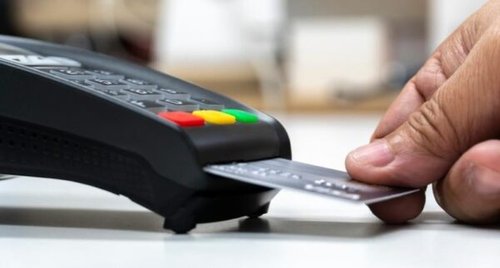Cryptocurrency is a popular new technology that many people think will become a large part of our financial system in the future. Though the technology is still young, many people invest in cryptocurrency and some people have started using it in their everyday life, though that remains the exception rather than the rule.
If you’re interested in adding crypto to your personal finance toolbox, here’s what you need to know.
Key takeaways
- Cryptocurrency is primarily an asset, not “money” in a strict sense of the term.
- Crypto can be bought, mined, traded or even earned via certain rewards credit cards.
- There are now ways to begin exploring crypto with significantly less risk even though volatility remains.
What is crypto and how does it work
Cryptocurrency is a digital form of currency, and while every cryptocurrency is different, almost all of them are secured with cryptography, making the currencies difficult to counterfeit. There are many types of crypto, including Bitcoin, Litecoin and Ethereum among others.
 Many cryptocurrencies rely on a decentralized network of computers to keep track of a ledger that tracks transactions. Many also allow anonymous ownership of crypto, which means some people look to crypto as a way to maintain privacy in today’s ever more public world or as an alternative to traditional currencies, which are subject to influence by central banks and government policy.
Many cryptocurrencies rely on a decentralized network of computers to keep track of a ledger that tracks transactions. Many also allow anonymous ownership of crypto, which means some people look to crypto as a way to maintain privacy in today’s ever more public world or as an alternative to traditional currencies, which are subject to influence by central banks and government policy.
What crypto currently isn’t, however, is a form of money, according to Jon Hoddenbagh, an economist and assistant professor at Johns Hopkins University’s School of Advanced International Studies.
Hoddenbagh explains that, by definition, there are three functions of money: 1. A medium of exchange, meaning a way to buy and sell goods and services; 2. A unit of account, meaning a measurement of value; and 3. A store of value, or a means of saving capital.
“Right now, cryptocurrencies, in a pure definition of the term, aren’t money,” Hoddenbagh says. “The first two functions of money… cryptocurrencies don’t really meet those. Proponents of cryptocurrency are really hoping that it will be a form of money in the future, but right now, it’s mostly a store of value.”
A short history of cryptocurrency
So where did cryptocurrency come from?
Researchers have long thought about electronic money and its applications, both as a store of value or medium of exchange and as a way to do business anonymously. As early as the 1980s cryptographers discuss the concept of electronic money.
In 2008, an anonymous programmer or group of programmers going by the name Satoshi Nakamoto published a paper titled “Bitcoin: A Peer-to-Peer Electronic Cash System.” This paper a process for creating a peer-to-peer network that could facilitate transactions without the need for a trusted central authority.
Satoshi Nakamoto put the Bitcoin network online on Jan. 3, 2009, by mining the first block of 50 bitcoins, effectively creating the first cryptocurrency.
By the end of 2010, others had created their own cryptocurrencies, often called altcoins. Online crypto exchanges also began to appear to help people buy and sell cryptocurrencies.
By 2012, online retailers began to accept cryptocurrency payments, and then 2016 and 2017 saw cryptocurrency booms as the price of a bitcoin rose to exceed $10,000 and many other cryptos saw huge gains.
Today, there are hundreds of cryptos on the market and it’s easier than ever for people to buy, sell and use cryptocurrency in their everyday life.
How do you buy crypto?
Cryptocurrency is an asset, a “digital modern version of an old commodity currency concept like gold or silver,” Hoddenbagh explains. “There’s a finite amount of gold in the ground and crypto has a finite supply. It’s an alternative financial asset. That’s how most financially savvy investors view cyrpto right now. Most people are aware you can’t really buy things directly with crypto, you typically need to convert your crypto into domestic currency like U.S. dollars to purchase goods and services from most businesses, but you can hold it as an asset class.”
Like other assets, you can buy crypto from other people relatively easily.
- Get a cryptocurrency wallet. There are many different kinds of wallets. You can download a wallet on your computer, buy a “hardware wallet” that you can carry around, or work with a company to get an online crypto wallet.
Your wallet works using what are called public and private keys. You give people your public key so they can send crypto to you. You use your private key, which you should never share with anyone, to send crypto to other people. If someone gets your private key, they have full access to your wallet, so it’s important to keep it secure.
- Start buying crypto. Many popular crypto exchanges, like Coinbase, let you buy and sell different cryptos on their site and store them in online wallets attached to your account. This is useful if you’re looking to trade crypto regularly. You’ll also have the option to send the coins you buy to another wallet you own for storage.
There are also some brokers that let you invest in crypto without giving you access to your wallet. These brokers make investing easy, but you never get full access to your coins, meaning you can’t send them to other people or use them to buy things.
How do you spend cryptocurrency?
You can spend crypto by paying directly to another person’s crypto wallet or, a simpler option, is to use a crypto debit card.
In the first case, you’ll need to find a merchant who is willing to accept cryptocurrency payments. While still uncommon, there is a growing number of retailers and websites that have started accepting major cryptos, like Bitcoin, though it will likely still be some time before you can expect to pay directly with Bitcoin for things like your morning latte.
You can spend crypto directly from your wallet by sending it to another person/merchant in a person-to-person transaction. In general, you work with a merchant to make a purchase and when it comes time to pay, the merchant will give you their cryptocurrency wallet’s address, and you use your wallet to send the payment to the merchant and wait for the transaction to clear. Note that the transaction can sometimes take 10 or 20 minutes to process.
Pay at the point-of-sale. A growing number of businesses, including Overstock, AT&T and Microsoft to name a few, will allow you to pay at the point of sale with crypto. To do so, you’ll lock in an exchange rate and then, in most cases, your payment will be converted to U.S. dollars (or whatever currency the merchant prefers) using a third-party app, such as Coinbase or BitPay.
“The best way to think about crypto at the moment, is there’s an exchange rate between the U.S. dollar and Bitcoin or Ethereum,” Hoddenbagh says. “At the moment, for the average consumer, I think the way to view crypto is as a foreign currency. You can park some money there, but to do most transactions, you’re going to have to convert it back into U.S. dollars.”
Crypto debit card. Another, simpler option, is to use a crypto debit card, which is basically a prepaid debit card loaded with crypto and useable with any merchants that accept debit cards. In this case, you’ll use your crypto debit card for your purchase and, once again, the purchase will be converted to the merchant’s fiat currency of choice.
Both CoinBase and BitPay, among several others, offer crypto debit cards.
Remember, too, that cryptocurrencies have shown tremendous value volatility over short periods of time, sometimes within a matter of hours. That could dramatically affect your payment and makes it difficult for merchants to price goods or services in Bitcoin or other crypto.
How do you earn cryptocurrency?
Buying crypto is one of the easiest ways to get cryptocurrency into your wallet, but there are also ways you can earn crypto without having to buy it.
Mining
Traditional cryptocurrency mining involves using computers to solve highly complicated equations in hopes of finding the right solution. If you do, you earn cryptocurrency as a reward.
Imagine someone put 1,000 sudokus in front of you, with one of them secretly being worth a prize. If you solve the correct sudoku before anyone else, you win the prize. The faster you can solve sudokus, and the luckier you are, the higher your chances of getting a prize. Mining is similar.
In reality, mining is almost never worth it. You need huge amounts of computing power to successfully mine most crypto and the electricity costs are immense. This is one of the reasons that many people complain about Bitcoin and other cryptos’ impact on the environment.
Currently, Bitcoin alone uses about 0.6% of the entire planet’s energy production – about as much as the entire country of Sweden.
Recently, however, there has been a rise in Helium mining, a different, much more energy-efficient form of cryptocurrency mining tied to building a decentralized wireless infrastructure via a network of connected hotspots.
Rewards Credit Cards
Some companies have launched credit cards that offer crypto rewards. These cards work like typical rewards credit cards, but those rewards are offered in the form of crypto.
- BlockFi Rewards Visa® Signature Credit Card. The card is a standard Visa® Signature card that offers typical credit card benefits. The card has no annual fee and no foreign transaction fees. When you use the card, you’ll earn 3.5% of your purchase back in Bitcoin during the first 90 days you have the card (up to $100 in Bitcoin earned). After that, you’ll get 1.5% back on purchases until you reach $50,000 in purchases. After that point, you’ll earn 2% back.
- The Venmo Card. Venmo lets cardholders use their cash-back rewards balance to buy cryptocurrencies, including Bitcoin, Litecoin, Ethereum, and more.
- Brex. This small business card offers lots of useful perks for small companies and lets business owners exchange their rewards points for bitcoin and Ethereum. You can earn up to 8 points for every dollar spent, making this card one way to earn crypto quickly.
If you’re looking for an easy way to earn some crypto, these cards can help you earn Bitcoin and other cryptos as part of your normal shopping routine.
When and why should you use crypto?
Unless you’re an enthusiast who is using crypto because you’re interested in the technology, it might be hard to know when and why you should consider using crypto over traditional currencies. When most people and businesses still use cash, debit cards, and credit cards, what’s the benefit of a more complicated technology?
One time when crypto is advantageous is when you want to be anonymous. Detractors argue that this makes crypto useful for criminals handling illicit transactions, but there are perfectly legal situations where someone might want a purchase to remain anonymous.
Crypto can also be useful if you’re looking to avoid certain fees, especially currency conversion fees. If you live in the U.S. and want to buy something from the UK, you typically have to convert your dollars to pounds somehow. This can incur fees and you might have to shop around to find a good exchange rate.
Cryptos are global, decentralized currencies, which means no foreign exchange fees, though there may be a transaction fee depending on the crypto used.
Because of their continued volatility and unknown future, Hoddenbagh, says, approaching them cautiously is advisable.
“You want to have a balanced portfolio, so in so far as cryptocurrencies, like Bitcoin, are an asset class, they do have value, and it might be worth converting a small percentage of your portfolio to crypto if you have the means to do that,” Hoddenbagh says. “They’re so volatile still, it’s very, very risky to be parking all your retirement account or discretionary account for everyday living in [cryptocurrencies].”
Is cryptocurrency safe?
Yes, using cryptocurrency is safe, so long as you take normal precautions. Just as you would never share your credit card information with someone, make sure you don’t share your crypto wallet’s private key with someone.
Also make sure that anyone you’re paying with cryptocurrency is reputable, as there is no way to reverse a transaction once it goes through.
Are there fees for using crypto?
Yes, some cryptocurrency transactions can involve paying a fee. The fee will depend on the crypto you’re using and how busy the cryptocurrency network is at the time.
Are cryptocurrencies volatile?
One drawback of crypto compared to fiat currencies is that they tend to experience large changes in value. This can make them hard to use on a daily basis as a Bitcoin that’s worth $45,000 one hour might be worth $40,000 the next hour.
For example, Bitcoin fluctuated in value between about $11,500 and $60,000 over a one-year period from August 2020 to August 2021. If you can’t predict how much spending power you have, it can be difficult to know whether you have enough crypto to do your shopping. Normal currency, while prone to some value changes, exchange rates and inflation, tends to be far less volatile.
Can you buy crypto with a credit card?
Sometimes, you can, but you may be limited by the exchange you want to use (not all allow credit card purchases) or even the bank that issues your credit card. Many major credit card issuers don’t allow purchases of cryptocurrencies and, if they do, they consider it a cash advance and charge cash advance fees and interest rates on the transaction. Therefore, even if you can use your credit card, it’s usually not a good idea. Using debt to buy a risky, volatile asset means losses could leave you unable to pay your monthly bills.
Which credit card companies allow cryptocurrency purchases?
Credit card company policies on this change all the time. If you’re wanting to make a crypto purchase with your card, it’s best to call your issuer directly and ask specific questions, such as:
- Can I buy cryptocurrency with my [insert card name here]?
- Is this transaction considered a cash advance?
- Are there any fees you will charge me for this transaction?
Criticisms of cryptocurrency
Cryptocurrency isn’t without critics. There are many people who criticize specific cryptos, or cryptocurrency as a whole.
One of the top criticisms of cryptocurrency is environmental. The process of mining Bitcoin, which is essential to the Bitcoin network’s operation, requires massive amounts of computing power. This, in turn, uses a lot of electricity.
Today, Bitcoin consumes more power than some countries each year. The electricity used could power the entire state of Washington for a full year. Critics argue that using this much electricity has massive impacts on pollution, all for something that is unnecessary and inefficient compared to existing ways to process financial transactions.
Another common criticism is that the anonymity that is a major draw for cryptos also makes it a haven for criminals. These critics argue that cryptocurrencies are primarily used for illegal transactions involving activities such as human trafficking and the drug trade.
The volatility of most cryptocurrencies is another source of criticism. Unless a country is going through hyperinflation, consumers generally know what their money can buy. With cryptos seeing massive daily price swings, a balance that buys you a full meal at a restaurant one day might not be enough to afford a sandwich the next.
Advantages and disadvantages of cryptocurrency
Cryptocurrencies have a lot of pros and cons to consider and, interestingly, many of cryptos characteristics could be considered both positive and negative. For instance, the anonymity of the transactions protects individual privacy… but also makes crypto an ideal medium of exchange for illegal transactions. There’s no central authority, like the Federal Reserve, that can influence the currency… but that also means there’s no organized way to control the wild volatility. Crypto has enormous potential to dramatically increase in value… and catastrophic potential to crash in value.
Every individual will approach crypto with their own opinions about these features and, as with any financial decision, should take it all into consideration before taking action.
Final thoughts
Cryptocurrency is growing more popular each day and more and more people are looking for a way to integrate it into their investment portfolios and daily lives. If you think that adding crypto to your financial toolkit is the right step for you, there are plenty of ways for you to do that. Keep in mind, though, that the future of crypto remains largely unknown.
“Bitcoin’s value is derived solely from its propensity to serve (at some point in the future) the three functions of money… in the long run, the degree to which Bitcoin and cryptocurrencies, in general, serve these three functions will determine their value and worth,” Hoddenbagh says. “For the average person, it’s worth exploring. My caution would be, in 10 years, it’s almost impossible to say right now what’s going to happen to a lot of these cryptocurrencies.”
ON THIS PAGE
- What is crypto and how does it work
- A short history of cryptocurrency
- How do you buy crypto?
- How do you spend cryptocurrency?
- How do you earn cryptocurrency?
- When and why should you use crypto?
- Is cryptocurrency safe?
- Are there fees for using crypto?
- Are cryptocurrencies volatile?
- Can you buy crypto with a credit card?
- Which credit card companies allow cryptocurrency purchases?
- Criticisms of cryptocurrency
- Advantages and disadvantages of cryptocurrency


